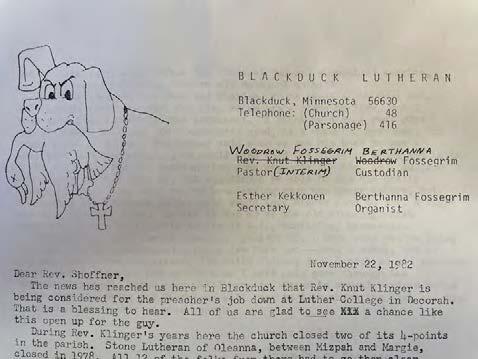
4 minute read
Jenifer Ward
from Agora Fall 2022
Always Re-Founding
by JENIFER WARD, President of Luther College
Ephesians 1:17-18
I pray that God may give you a spirit of wisdom and revelation as you come to know him, so that, with the eyes of your heart enlightened, you may know what is the hope to which God has called you.
What would it really mean to let light into the eyes of our hearts so that we may know the hope to which God has called us? Founder’s Day commemorations at Luther College and other institutions, especially when they come at the same time as Indigenous People’s Day, run the risk of resting solely in the past. On the one hand, a thoughtful celebration of this college and its history, of the recitation of the many names associated with the beautiful parts of the history of this place—Larsen, Koren, Preus, Sperati, Noble—and the events that marked significant changes in how we understood who we are: welcoming the first Black students, the first women students, the first music ensembles,the first sports teams, the addition of academic programs and clubs, the planting of “Darryl”—our wind turbine—high above campus to catch the wind, solar arrays. On the other hand, we appropriately acknowledge that the Norwegian immigrants who settled here and thought to found a college were not the first people to canoe this part of the Upper Iowa river, not the first ones to grow food, not the first ones to raise families and live in community. They were displaced—perhaps not by Laur Laursen himself—but nonetheless displaced. On the first hand, joyful celebration and nostalgia. On the other hand, somber reflection and knowing that our prosperity and opportunity were worked out on ground that we found—not ground we created. We see both these things when we face the past of Luther College. At the same time, our text exhorts us to know what is the hope to which God has called us. This is a decidedly future-facing assignment. We don’t need hope for what is past, what was already displaced, what was already founded. We only need hope for what is before us. How do we look backwards and look forwards at the same time? How do we hold acknowledgment and contrition in the same place that we hold hope and creativity and a desire for beloved community? There are a couple of well-known possibilities for looking backwards and forwards in our cultural history, neither of which seems very practical: in ancient times, people believed the god Janus— from which we take the name January— had a two-faced head, one that looked to the past and one that looked to the future at the same time. There was certainly no movement involved in this image, but a static observation of what was behind and what was before. More recently, in 1921, the German philosopher Walter Benjamin purchased the Swiss-German artist Paul Klee’s painting Angelus Novus (“new angel”). Benjamin writes: “A Klee painting named ‘Angelus Novus’ shows an angel looking as though he is about to move away from something he is fixedly contemplating. His eyes are staring, his mouth is open, his wings are spread. This is how one pictures the angel of history. His face is turned toward the past. Where we perceive a chain of events, he sees one single catastrophe which keeps piling wreckage upon wreckage and hurls it in front of his feet. The angel would like to stay, awaken the dead, and make whole what has been smashed. But a storm is blowing from Paradise; it has got caught in his wings with such violence that the angel can no longer close them. This storm irresistibly propels him into the future to which his back is turned, while the pile of debris before him grows skyward. This storm is what we call progress.” Is this what change must feel like? Is this the only way to make progress? To feel violently battered by winds so powerful that they propel us into the future toward a pile of debris, because we can’t repair the mistakes of the past or awaken the dead and get an existential do-over? Let me suggest a third possibility. When I was inaugurated as your president around this time in 2019, I was asked to choose a “theme” for that ritual moment. I chose to tie together two references that have been important to me—one from the poet Rilke, in which he asks a young poet to be “immer im werden”—always questioning, always loving the questions, and always in the process of becoming, knowing that to answer the questions would be to stop growing and becoming. The second is from this college’s namesake, Martin Luther: “This life therefore is not righteousness, but growth in righteousness,
OCTOBER 14, 2022 (Founder's Day)
Jenifer Ward
not health, but healing, not being but becoming.” What if we thought of the “founding” of Luther College as an ongoing process, as always becoming? What if every day is a re-founding? What if, rather than a pile of debris before us as we are propelled forward by the storms of change, we see a pile of lessons learned—both positive and negative; a pile of opportunities to repair, but with the eyes of our heart always enlightened by what that might look like for our future together; and a pile of tools: knowledge, trust, empathy, discipline, collaboration, curiosity? What would the ears of our heart hear if we sang “Jubilee”* every single day? What would the eyes of our heart see if we saw both the hope and the intention to re-found, every single day, Luther College? And finally: can we, as a community, love these questions? Amen.
* Thanks to Norskkor for singing “O Sing Jubilee” during today’s chapel.










